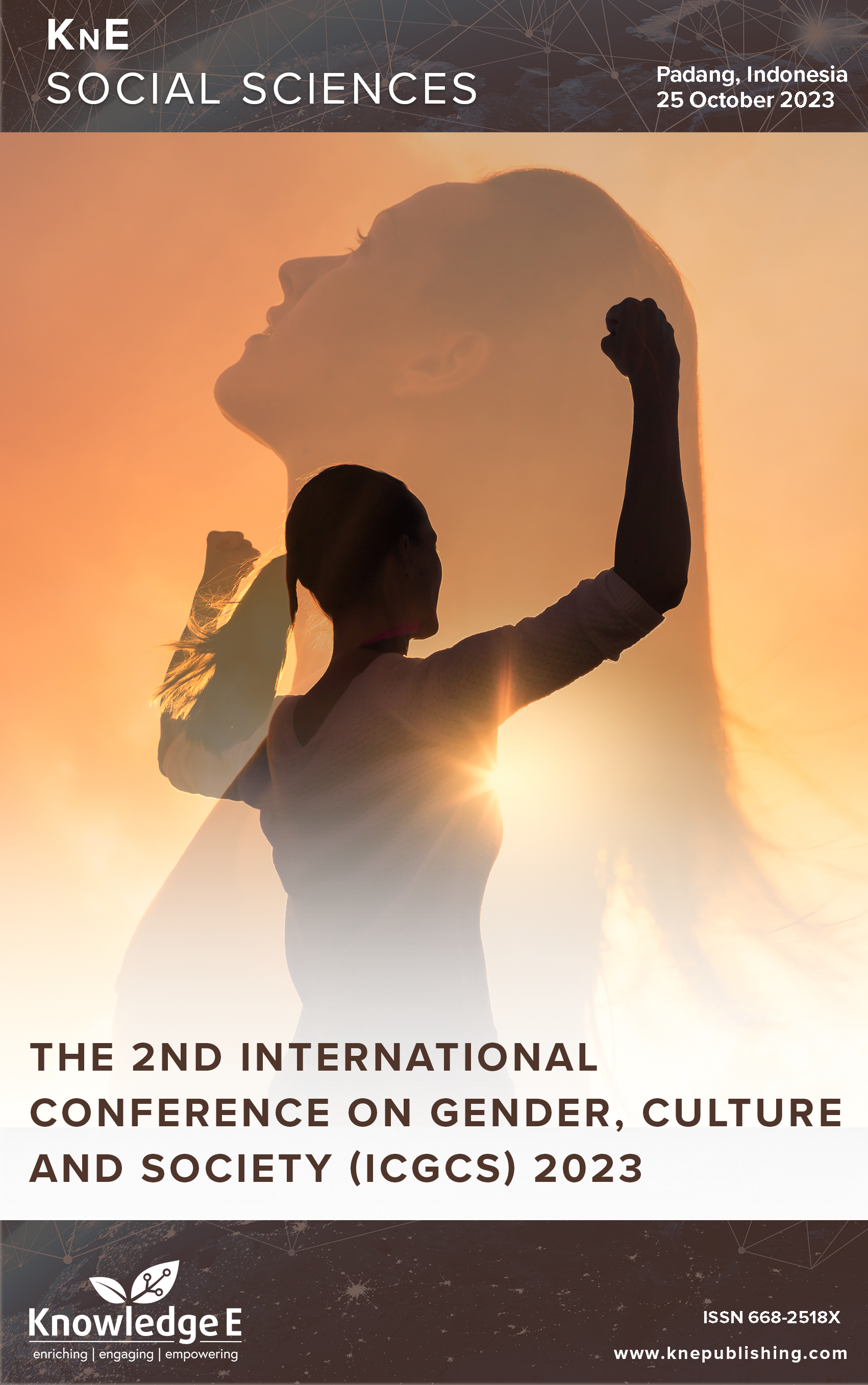Women Initiatives and Its Impact on Agro-Ecotourism Development in Rural Areas
DOI:
https://doi.org/10.18502/kss.v9i23.16646Abstract
In Indonesia, a new form of tourism called agro-ecotourism has emerged from rural agricultural activities. It holds great promise in conjunction with cultural and ecotourism. The participation of women in agro-ecotourism has had substantial impact on its development and socio-economic well-being. However, the societal expectations that limited women to the home have diminished their significance within it. This article analyzed the current status of agro-ecotourism in Sukowilangun village, Kalipare sub-district, Malang District, East Java. The focus was on identifying the factors that drove and hindered participation in tourism, with a particular emphasis on gender. This article also explored the role of local communities in the development of a gender-inclusive agro-ecotourism model. This study utilized a qualitative approach, incorporating in-depth interviews and Rapid Rural Appraisal (RRA) techniques. It was evident from the findings that, despite progress in the tourism sector, the current level of female involvement in tourism destinations remains unsatisfactory. It was discovered that Sukowilangun village has great potential for developing Agro-ecotourism centered around processed cassava. This initiative, led by The Perempuan Singkong, a collective of migrant women’s families, shows great promise as a source of income and a way to generate more community interest in tourism. Lastly, the development of a top-notch tourism destination necessitates the focus on three crucial aspects: establishment of proper institutions, investment in skilled personnel, and fostering women’s involvement. Through the promotion of gender equality and the inclusion of women in decision-making processes, tourism destinations foster a more diverse and inclusive environment that brings benefits to all.
Keywords: Agro-ecotourism; Community-based; Institutionalization; Women- participation
References
Pan SY, Gao M, Kim H, Shah KJ, Pei SL, Chiang PC. Advances and challenges in sustainable tourism toward a green economy. Sci Total Environ. 2018 Sep;635:452– 69. DOI: https://doi.org/10.1016/j.scitotenv.2018.04.134
Kementerian Pariwisata dan Ekonomi Kreatif Republik Indonesia. Peraturan Menteri Pariwisata dan Ekonomi Kreatif/Kepala Badan Pariwisata dan Ekonomi Kreatif Republik Indonesia Nomor 9 Tahun 2021 Tentang Pedoman Destinasi Pariwisata Berkelanjutan [Transl. Ministry of Tourism and the Creative Economy of the Republic of Indonesia. Regulations of the Minister of tourism and creative economies/Head of the Agency for Tourist and Creative Economies of the Republik of Indonesia No. 9 Year 2021 on the Guidelines for Sustainable Tourism Destinations]. Kementerian Pariwisata dan Ekonomi Kreatif Republik Indonesia Jakarta; 2021 p. 2–75 [Transl. Ministry of Tourism and Creative Economy of the Republic of Indonesia Jakarta; 2021 p. 2–75].
Hatma IJP, Izudin A, Aditya R. The role of ecotourism in developing local communities in Indonesia. 2022. https://doi.org/101080/1472404920222117368.
Gale T, Hill J. Ecotourism and Environmental Sustainability: An Introduction. 1st ed. Ecotourism and Environmental Sustainability: Principles and Practice. Surrey: Ashgate Publishing; 2009.
Butcher J. Ecotourism, NGOs and development: A critical analysis. Ecotourism, NGOs. Dev A Crit Anal. 2007. P 1–189. DOI: https://doi.org/10.4324/9780203962077
Fennell DA. Ecotourism and the myth of indigenous stewardship. J Sustain Tour. 2008;16(2):129–49. DOI: https://doi.org/10.2167/jost736.0
Fennell DA, Dowling RK. Choice Reviews Online. Ecotourism policy and planning. Volume 41. Oxford, UK: CABI Publishing; 2003. DOI: https://doi.org/10.1079/9780851996097.0000
Simanungkalit V, Sari DA, Teguh F, Ristanto H, Permanasari IK, Sambodo L. Buku Panduan Pengembangan Desa Wisata Hijau [Transl. Green Tourism Village Development Guide Book]. Asisten Deputi Urusan Ketenagalistrikan dan Aneka Usaha Kementerian Koperasi dan UKM Republik Indonesia [Transl. Assistant Deputy Assistant of the Ministry of Cooperation and Small and Medium-sized Enterprises of the Republic of Indonesia]. 2015.
Sulistyani AT, Wulandari Y. Proses Pemberdayaan Masyarakat Desa Sitimulyo Kecamatan Piyungan Kabupaten Bantul Dalam Pembentukan Kelompok Pengelola Sampah Mandiri (KPSM) [Transl. Sitimulyo village community empowerment process of Piyungan district of Bantul in the formation of independent garbage management group]. Indonesian Journal of Community Engagement. 2017;2(2):146–62. Available from: https://jurnal.ugm.ac.id/jpkm/article/view/27024 DOI: https://doi.org/10.22146/jpkm.27024
Sukesi K. Penelitian Aksi Untuk TKW Melalui Kegiatan Koperasi dan Pencegahan Kekerasan Dalam Rumahtangga (KDRT) [Transl. Action Research for the Power of Women Workers Through Cooperative Activities and Prevention of Domestic Violence]. Malang. 2007.
Sukesi K. Kajian dan Pelatihan Kewirausahaan Bagi TKW Purna [Transl. Entrepreneur- ship Study and Training for Retired Women Workforce]Malang; 2018.
Sukesi K, Yuliati Y, Nurhadi I, Inggrida JA, Armila. Sosiologi Gender: Konsep dan Aplikasinya di Pedesaan [Tranls. Sociology of Gender: Concept and Application in Rural Areas]. UB Press; 2020.
Abdullah I. Kemiskinan: Tantangan Struktural Dan Peluang Kultural [Transl. Poverty: Structural Challenges and Cultural Opportunities]. Jurnal Ketahanan Nasional 13. 2008;13(1-17). Available from: https://jurnal.ugm.ac.id/jpkm/article/view/27024
Cini F, Passafaro P. Youth and ecotourism: A qualitative exploration. Tour Hosp Res. 2019;19(1):126–31. DOI: https://doi.org/10.1177/1467358417704887
Fennell DA. On tourism, pleasure and the summum bonum [Internet]. J Ecotour. 2018;17(4):383–400. DOI: https://doi.org/10.1080/14724049.2018.1529180
Bhatta K, Ohe Y. Farmers’ willingness to establish community-based agritourism: evidence from Phikuri village, Nepal. Int J Tour Sci [Internet]. 2019;19(2):128–44. DOI: https://doi.org/10.1080/15980634.2019.1621536
Harrison, D., Schipani, S., Lao. Tourism and Poverty Alleviation: Community-Based Tourism and the Private Sector. Pro-poor Tour Who Benefits? Perspect Tour Poverty Reduct. 2007. p 84–120. DOI: https://doi.org/10.21832/9781845410766-005
Sharpley R. Sustainable tourism governance: local or global? [Internet]. Tour Recreat Res. 2022;(1–4): https://doi.org/10.1080/02508281.2022.2040295. DOI: https://doi.org/10.1080/02508281.2022.2040295
Sukesi K. Peran Perempuan Dalam Pembentukan Karakter Bangsa [Transl. The Role of Women in the Formation of the Nation’s Character]Makasar; 2011.
Indiarti W, Mahdi A, Mulyati T. Pengembangan Program Desa Wisata dan Ekowisata Berbasis Partisipasi Masyarakat di Desa Kemiren Kabupaten Banyuwangi [Transl. Development of Village Tourism and Ecotourism Programs Based on Community Participation in Kemiren Village, Banyuwangi Regency]Banyuwangi; 2013.
Miles MB, Huberman M, Saldana J. Qualitative Data Analysis A Methode Sourcebook. Sage Publication; 2014.

